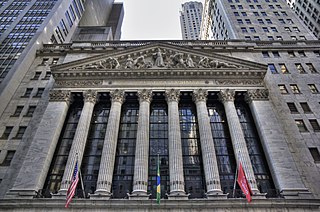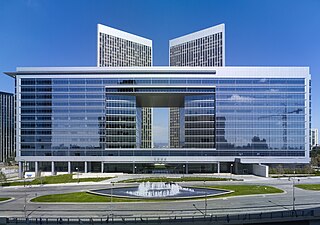
A stock exchange, securities exchange, or bourse is an exchange where stockbrokers and traders can buy and sell securities, such as shares of stock, bonds and other financial instruments. Stock exchanges may also provide facilities for the issue and redemption of such securities and instruments and capital events including the payment of income and dividends. Securities traded on a stock exchange include stock issued by listed companies, unit trusts, derivatives, pooled investment products and bonds. Stock exchanges often function as "continuous auction" markets with buyers and sellers consummating transactions via open outcry at a central location such as the floor of the exchange or by using an electronic trading platform.
A closed-end fund (CEF) is a fund that raises capital by issuing a fixed number of shares which are not redeemable, and then invest that capital in financial assets such as stocks and bonds. Unlike open-end funds, new shares in a closed-end fund are not created by managers to meet demand from investors. Instead, the shares can be purchased and sold only in the market, which is the original design of the mutual fund, which predates open-end mutual funds but offers the same actively-managed pooled investments.
In the field of finance, the term private equity (PE) refers to investment funds, usually limited partnerships, which invest in and restructure private companies. A private-equity fund is both a type of ownership of assets and is a class of assets, which function as modes of financial management for operating private companies that are not publicly traded in a stock exchange.
A real estate investment trust is a company that owns, and in most cases operates, income-producing real estate. REITs own many types of commercial real estate, including office and apartment buildings, warehouses, hospitals, shopping centers, hotels and commercial forests. Some REITs engage in financing real estate.
An exchange-traded fund (ETF) is a type of investment fund and exchange-traded product, i.e. they are traded on stock exchanges. ETFs are similar in many ways to mutual funds, except that ETFs are bought and sold from other owners throughout the day on stock exchanges whereas mutual funds are bought and sold from the issuer based on their price at day's end. ETFs can hold assets such as stocks, bonds, currencies, futures contracts, and/or commodities such as gold bars, and generally operates with an arbitrage mechanism designed to keep it trading close to its net asset value, although deviations can occasionally occur. Most ETFs are index funds: that is, they hold the same securities in the same proportions as a certain stock market index or bond market index. The most popular ETFs in the U.S. replicate the S&P 500, the total market index, the NASDAQ-100 index, the price of gold, the "growth" stocks in the Russell 1000 Index, or the index of the largest technology companies. The list of assets that each ETF owns, as well as their weightings, is posted on the website of the issuer daily, or quarterly in the case of active non-transparent ETFs. The largest ETFs have annual fees of 0.03% of the amount invested, or even lower, although specialty ETFs can have annual fees of 1% or more of the amount invested. These fees are paid to the ETF issuer out of dividends received from the underlying holdings or from selling assets.
An investment trust is a form of investment fund found mostly in the United Kingdom and Japan. Investment trusts are constituted as public limited companies and are therefore closed ended since the fund managers cannot redeem or create shares.
An income trust is an investment that may hold equities, debt instruments, royalty interests or real properties. It is especially useful for financial requirements of institutional investors such as pension funds, and for investors such as retired individuals seeking yield. The main attraction of income trusts, in addition to certain tax preferences for some investors, is their stated goal of paying out consistent cash flows for investors, which is especially attractive when cash yields on bonds are low. Many investors are attracted by the fact that income trusts are not allowed to make forays into unrelated businesses; if a trust is in the oil and gas business, it cannot buy casinos or motion picture studios.

Federated Hermes is an investment manager headquartered in Pittsburgh, Pennsylvania, United States. Founded in 1955 and incorporated on October 18, 1957, the company manages $669 billion of customer assets, as of Dec. 31, 2022. The company offers investments spanning equity, fixed-income, alternative/private markets, multi-asset and liquidity management strategies, including mutual funds, exchange-traded funds (ETFs), separate accounts, closed-end funds and collective investment funds. Clients include corporations, government entities, insurance companies, foundations and endowments, banks and broker/dealers.
Private equity real estate is a term used in investment finance to refer to a specific subset of the real estate investment asset class. Private equity real estate refers to one of the four quadrants of the real estate capital markets, which include private equity, private debt, public equity and public debt.

The history of private equity and venture capital and the development of these asset classes has occurred through a series of boom-and-bust cycles since the middle of the 20th century. Within the broader private equity industry, two distinct sub-industries, leveraged buyouts and venture capital experienced growth along parallel, although interrelated tracks.

Private equity in the 2000s represents one of the major growth periods in the history of private equity and venture capital. Within the broader private equity industry, two distinct sub-industries, leveraged buyouts and venture capital expanded along parallel and interrelated tracks.
Publicly traded private equity refers to an investment firm or investment vehicle, which makes investments conforming to one of the various private equity strategies, and is listed on a public stock exchange.

Ares Management Corporation is a global alternative investment manager operating in the credit, private equity and real estate markets. The company was founded in 1997 with additional offices across North America, Europe, and Asia.
Virtus Investment Partners, Inc. operates a multi-manager asset management business, comprising a number of individual affiliated managers, each having its own investment process and brand, and the services of unaffiliated sub advisers.
SteelPath was an investment advisory firm based in Dallas, Texas that specialized exclusively in master limited partnerships ("MLPs"). The company was registered with the U.S. Securities and Exchange Commission as an investment advisor. In 2010, the company received press attention by becoming the first investment advisor to offer open-ended MLP mutual funds. In July 2012, OppenheimerFunds, now Invesco, acquired SteelPath for its MLP business.

Invesco PowerShares is an American boutique investment management firm based near Chicago which manages a family of exchange-traded funds or ETFs. The company has been part of Invesco, which markets the PowerShares product, since 2006.
Real Assets is an investment asset class that covers investments in physical assets such as real estate, energy, and infrastructure. Real assets have an inherent physical worth. Real assets differ from financial assets in that financial assets get their value from a contractual right and are typically intangible.

American Capital, Ltd. was a publicly traded private equity and global asset management firm, trading on NASDAQ under the symbol “ACAS” from 1997 to 2017 and a component of the S&P 500 Index from 2007 to 2009. American Capital was sold to Ares Management in 2017 at a sale price that totaled $4.1 billion. For those investors who bought American Capital stock in its August 29, 1997 IPO, and held their shares through the sale of American Capital on January 3, 2017, they received a 14% compounded annual return including dividends.
Private credit is an asset defined by non-bank lending where the debt is not issued or traded on the public markets. Private credit can also be referred to as "direct lending" or "private lending". It is a subset of "alternative credit".






